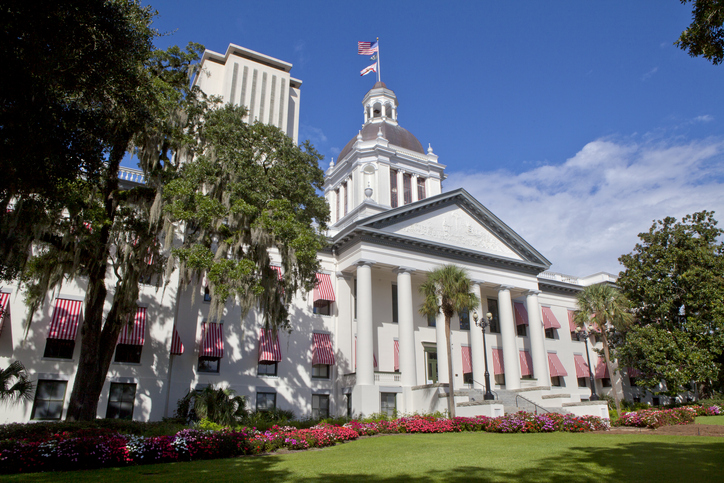The Agriculture and Flooding Subcommittee of the Florida state legislature ended its 2022 session on March 14 with a handful of new laws that will impact farmers and rural residents in several segments, including Fish and Wildlife Conservation, boating safety, nutrient application management for citrus growers, the Florida Citrus Commission, and agritourism.
At Florida Farm Bureau Insurance, we strive to support our agricultural community in every way possible. Keeping you informed about legislative action is an important step in staying abreast of regulations that affect their interests. Below, we highlight summaries of these bills, as documented on the Florida House of Representatives 2022 Session Summary. Each bill will become effective July 1, 2022.
CS/CS/SB 494 – Fish and Wildlife Conservation
This bill specifies that an owner or party responsible for a vessel declared a public nuisance who does not remove the vessel within 21 days after a notice directing its removal is liable for all costs of removal, storage, destruction, and disposal of the vessel. The bill allows local governments to use certain grants related to derelict vessels for the removal, storage, destruction, and disposal of vessels declared a public nuisance.
The bill prohibits local governments from establishing public bathing beaches or swim areas on certain waters.
It authorizes a person to operate a human-powered vessel within the Florida Intracoastal Waterway when participating in certain club athletic teams or sports affiliated with an educational institution under certain circumstances.
The bill requires each lead land managing agency to consider the feasibility of using specified state lands at gopher tortoise recipient sites and requires the Fish and Wildlife Conservation Commission (FWC) to follow specified timelines related to gopher tortoise recipient site permitting.
The bill authorizes a law enforcement employee of FWC or the Florida Forest Service to use drones for the purposes of managing and eradicating invasive exotic plants or animals on public lands and suppressing and mitigating wildfire threats.
CS/SB 606 – Boating Safety
Beginning January 1, 2023, the Boating Safety Bill prohibits a livery from offering a vessel for lease or rent without first being issued a no-cost livery permit by the Fish and Wildlife Conservation Commission (FWC), which must be renewed annually. The bill also requires liveries to implement certain safety requirements and establishes penalties for violations of livery requirements.
Beginning October 1, 2022, the bill expands the list of topics that must be included in FWC boating safety education courses and materials. The bill authorizes a court to order a person who is convicted of a violation related to boating collisions and accidents to pay an additional fine. In addition, the bill increases or establishes maximum penalties for certain noncriminal infractions of vessel safety laws and increases the default civil penalty for noncriminal infractions. The bill requires a person who is subject to mandatory boating safety education requirements as a result of certain violations of vessel laws to pay a fine and requires FWC to maintain a program to ensure violators comply with such requirements.
CS/CS/SB 1000 – Nutrient Application Rates
The bill authorizes citrus producers to use site-specific nutrient management, which is the application of nutrients at a different rate than the published nutrient application rates, under certain circumstances. Site-specific nutrient management may be used when recommended nutrient application rates published by the University of Florida Institute of Food and Agricultural Sciences (UF/IFAS) or other postsecondary institutions with agricultural research programs are not appropriate for a specific producer due to certain conditions.
The bill directs UF/IFAS to analyze site-specific nutrient management for crops other than citrus and crop rotations, develop a research plan and interim recommendations for implementation of site specific nutrient management, and submit an annual report to the Governor and Legislature. The bill provides an expiration date of June 30, 2026, for the provision authorizing the use of site-specific nutrient management by citrus producers, and extends the expiration dates for several other statutory provisions related to fertilization management.
CS/HB 1097 – Florida Citrus
The bill revises the membership and qualifications of the Florida Citrus Commission. It also increases the number of citrus districts from three to six and redistributes the counties that comprise each district. The bill requires certain entities that expend funds received from the State Treasury on certain citrus production research to deliver a biannual report to the commission.
In addition, the bill requires any new variety of citrus fruit developed as a result of any research or study using funds from the State Treasury, as well as any technology that enhances citrus fruit marketability, to be made exclusively available to the Department of Citrus or its designee for a specified period.
SB 1186 – Agritourism
The bill prohibits the denial or revocation of an agricultural land classification solely due to the conduct of agritourism activity on a bona fide farm or the construction, alteration, or maintenance of a nonresidential farm building, structure, or facility on a bona fide farm that is used to conduct agritourism activities.
So long as the building, structure, or facility is an integral part of the agricultural operation, the land it occupies must be considered agricultural in nature. The bill also requires such buildings, structures, and facilities and other improvements on the land to be assessed at their just value and added to the agriculturally assessed value of the land.
Support Florida Farmers with Farm Bureau Insurance
When you insure with Farm Bureau insurance, you help to advocate for the rights of Florida Farmers. To learn more about insuring with us, contact a local agent using our Agent Finder.

